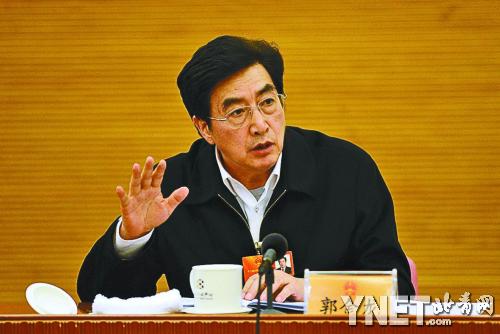Guo Jinlong: Keep transforming economic growth pattern
- By Lu Na
 0 Comment(s)
0 Comment(s) Print
Print E-mail China.org.cn, March 10, 2013
E-mail China.org.cn, March 10, 2013
|
|
|
According to Guo, Beijing's progress in energy conservation and emissions reduction takes the lead in China. |
Consistently transforming the economic growth pattern and achieving sustainable development are still top issues in the future development of Beijing, according to Guo Jinlong, deputy to the ongoing annual session of the National People's Congress (NPC) and secretary of the Beijing Municipal Committee of the Communist Party of China (CPC).
Guo pinpointed several major characteristics in the city's development over the past few years, including the development concept of being culturally-enriched, environmentally-friendly and technology-empowered put forward during the 2008 Olympcs, the industrial restructuring represented by the relocation of Shougang Group out of Beijing and energy conservation and pollution reduction.
According to Guo, Beijing's progress in energy conservation and emissions reduction takes the lead in China. Energy consumption for every ten thousand yuan GDP consists of 0.44 tons of coal and 21.5 cubic meters of water.
Guo said the tertiary industry now accounted for 76.4 percent of the local economy and the primary and secondary industry 0.8 percent and 22.8 percent, respectively, suggesting that Beijing has established a service-industry based economy.
Besides, as capital of China, Beijing should magnify its exemplary role in China's development. It should do well in innovation-driven development, as well as in urban and rural integration development, Guo urged.
Resonating Premier Wen Jiabao's call for improving management of megacities and big cities in the government report delivered on March 5, Guo said Beijing must face up to the contradiction of the population, resources and environment, solve difficulties the megacity faced in its management and service provision, pay more attention to the construction of an ecological civilization and endeavor toward more elaborated megacity management.
In addition, it needs to strengthen the development of a public service system.






